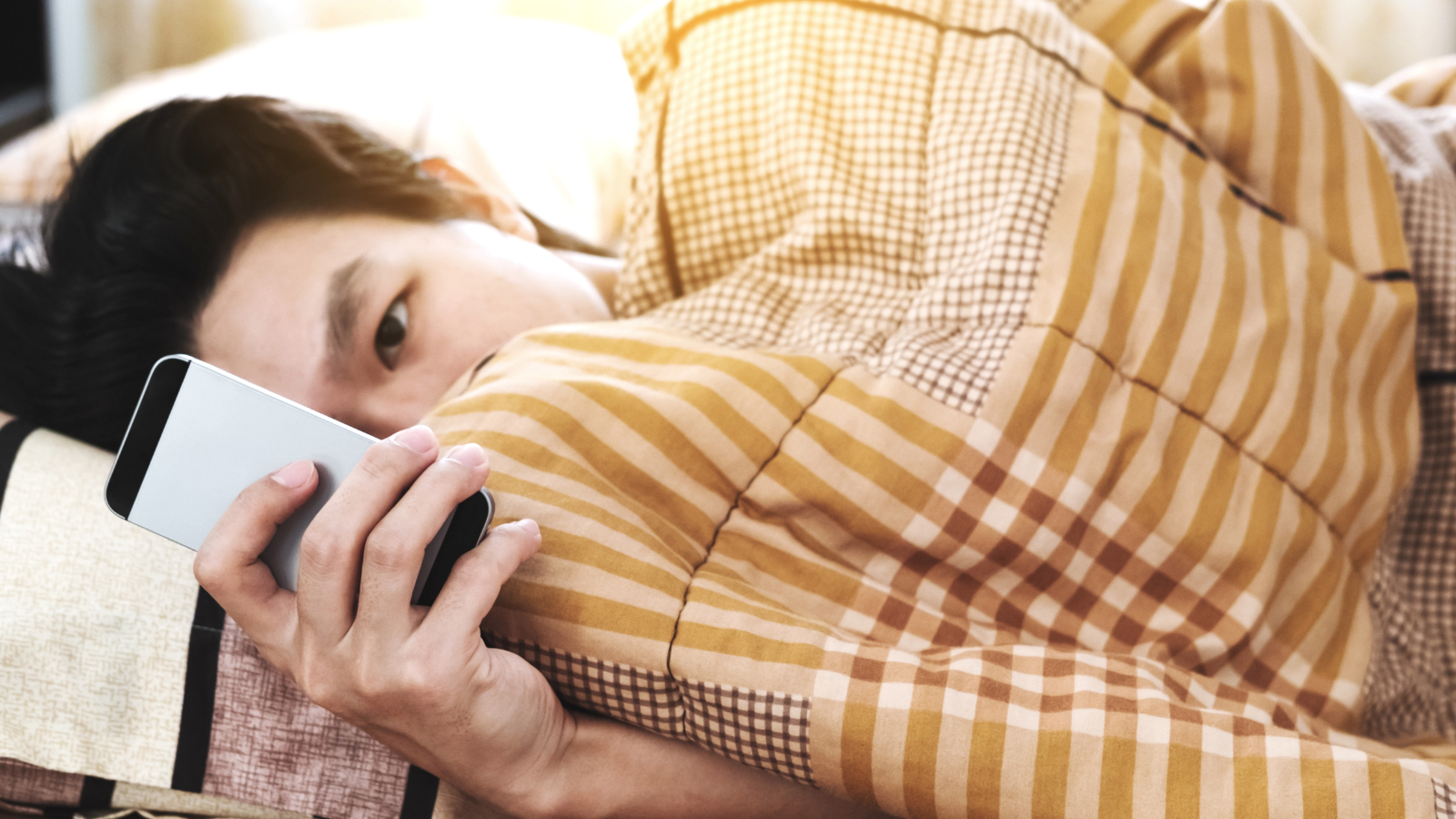In the next room your teenager finally dips into sleep after struggling to quiet her mind. Not more than two hours later she’s wakes up, her brain busily replaying something that happened with her friends the day before. Without thinking much about it, your teenager reaches for her phone to get her mind off things and settles in for some late-night scrolling.
Your day is finally over. Having juggled work, relationships, kids, and life, you’re exhausted and can’t wait to finally get some sleep, You’re hoping to catch up from the sleep deficit from too many late nights. You flop down on your bed, stretch your arms out, let out a giant yawn. Then you decide for a last minute check on any missed texts or recent Facebook posts.

Do either of those scenarios sound familiar? If so, you’re part of the majority of parents in this country, 62% of whom report sleeping with their phones within reach of the bed. Fewer teenagers keep their phones within an arm’s reach at night, but those that do are twice as likely as parents to sleep with their phones in the bed with them.
Devices do so many things! They deliver news, music, friends, and alarms so it is no surprise that so many of us sleep with them. Plus it seems fairly harmless to watch YouTube videos of cute cats or connect with a friend right before bed.
The problem isn’t necessarily what we are doing on our phones late at night; it’s what we aren’t doing very well: sleeping.
More phone use, less sleep
A recent review of the research showed that our phones tend to keep us up later and disturb our sleep. Why? Phones get in the way of teenager’s sleep in several ways:
- Effects of blue light. The glow emanating from screens disrupts our sleep cycle by delaying melatonin release. Melatonin, by the way, is the chemical that makes us sleepy.
- Trouble falling asleep. Our online activities keep us awake. Checking one email, reading a post, or sending something to a friend activates our brains and makes it harder to unwind.
- Trouble staying asleep. Chimes, nudges, push notification, buzzes, and alerts wake us up at night. Once we are awake, our seeking brain immediately starts wondering, “What was that alert anyway?” The urge to check is almost impossible to resist.
Many parents report that they put a tablet in their child’s room because they think it helps their child fall asleep. Moreover, we don’t reach for our phones in the night hoping for an adrenaline rush. Instead we scroll hoping it will lull us to sleep. While this sounds plausible, the research shows that the impact is just the opposite of what we’re hoping for.
For teens the impact is even magnified. That’s because their natural sleep-wake cycle changes when they hit puberty meaning that they don’t get sleepy until later at night. Combine this natural shift with late night phone use and the result is a lot of tired teens who haven’t gotten nearly enough shuteye when the alarm rings for school early the next morning.

The brain costs of low sleep quality
Losing sleep doesn’t just make children and teenagers tired; it makes their brains less effective when they’re awake.
Sleeping isn’t as simple as it looks. Scientists believe that as many as 50 brain chemicals are involved in sleeping. Snoozing kids look so relaxed it is hard to imagine that their brains are actually hard at work:
- House cleaning: The brain sifts through the day’s learning and memories, solidifying important new connections while pruning away weak or less important ones.
- Problem solving: Brain scans show that the brain is quite active during sleep, figuring out solutions to those tough-to-solve problems we couldn’t figure out the day before.
- Recharging: Sleep is the best way to recharge our brain’s executive functions which allow us to learn, manage feelings and stress, use working memory, and make sound decisions.
A clinical psychologist at Tel Aviv University, Dr. Avi Sadeh, found a significant performance gap between sleep deprived and well rested students. Students who got just one less hour of sleep per night for three nights in a row experienced a cognitive slide equivalent to two grade levels.
When it comes to children and sleep, there are huge consequences to even small amounts of sleep deprivation.
Anxiety in teenagers: Don’t ignore phones and sleep
If you are worried that teens’ phone use makes them more anxious, you aren’t alone. While studies have demonstrated a link between the two, it still remains a bit tricky to make conclusive statements that phones causing anxiety for a couple of reasons.
First, most of the studies show a correlation, making it difficult to know if phones make kids more anxious or if anxious kids turn to their phones more often. Second, kids are complicated! There are all kinds of things that contribute to mental health and well being including how they use their devices.
That said, one thing is coming into focus: there is a clear connection between teenagers, phone use, sleep, and mental health.
We’ve known for a long time that sleep is essential for emotional regulation and teen’s ability to manage stress so researchers have long suspected that sleep “mediates” the impact of technology on mental health.
Now there are some studies confirming this hypothesis. They show us that ‘night-time specific’ use of technology is a stronger predictor of anxiety and depression than simple measures of screen time. In other words, studies like this shed light on a pathway where phones at night → worse sleep → increased levels of anxiety and depression.
Given that many teenagers sleep with phones within reach, this is no small thing. We will continue to parse out the various ways that technology either boosts or erodes our mental health. But it will be much more difficult to get a clear view of this if we are too tired to make sense of it. Before you throw your teenager’s devices out the window entirely, start with a good night’s sleep.
Well rested, we might just be better able to make good choices when we plug back in the next morning.
Ways to sleep better:
- Model good habits. The data is clear – we adults aren’t any better than our kids. Model what it looks like to protect your sleep.
- Charge phones outside of the bedroom. Start this as soon as your child gets a phone. It becomes more difficult with teenagers. If your teen already sleeps with their phone, start with a whole family conversation, “We all need good sleep. Let’s all commit to a refresh on how we use our phones at night.”
- Get clear on sleep recommendations for your child’s age. Every age cohort is chronically underslept and many of us have lost track of the sleep recommendations for what brains and bodies need.
- Go screen free before bed. Check out these apps that can help you stick to that downtime. It is challenging that homework is screen-based as well so do what you can based on your child’s online responsibilities.
- Limit caffeine.
- Exercise and get moving during the day. Tired bodies lead to better sleep.
- Wind down. Even if your child isn’t sleepy, help them identify what helps them calm their bodies and brain. For example, my eight-year-old loves to watch a lava lamp from his bed to calm his brain down 🙂
- Use Apps carefully.If your child uses apps like Headspace, Calm or other calming mindfulness apps, restrict all other functions on the phone overnight.